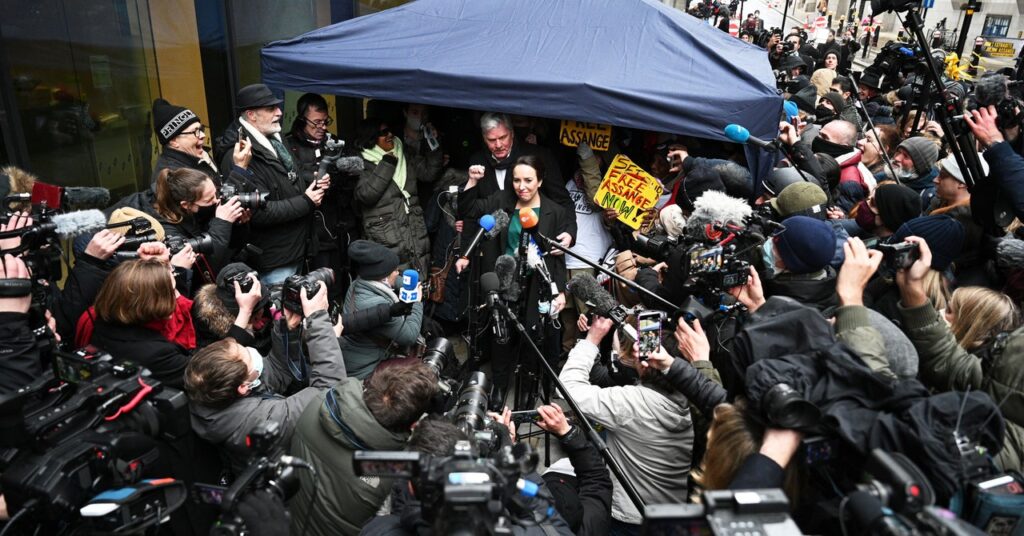Since Wikileaks began releasing massive troves of US military and State Department secrets more than 10 years ago, Julian Assange has maintained that the American government would eventually seek to put him in a US prison. In a surprise twist, he may escape that fate—not because his organization’s leaks are protected by free speech rights, but instead due to Assange’s mental health, and a court’s ruling that subjecting him to US incarceration could increase the risk of suicide.
In a London courtroom Monday morning, UK judge Vanessa Baraitser ruled that the US cannot extradite Assange to stand trial for criminal charges of hacking conspiracy and violations of the Espionage Act, which the US Department of Justice first leveled against Assange in 2019. Baraitser argued in her ruling that extradition would be unacceptably “oppressive” due to Assange’s mental state—including diagnoses of Asperger syndrome, autism, and suicidal thoughts—and the risk that Assange would in fact kill himself if those conditions were exacerbated by the state of isolation he’d likely face in the US justice system.
In her statement, Baraitser compared the “special administrative measures” that Espionage Act convicts often face in prisons like ADX Florence, the Colorado prison where Assange would be likely be incarcerated in the US, to those in the UK’s Belmarsh prison where he’s been housed since his arrest. She detailed how he’d be allowed only two non-legal phone calls a month, denied contact with other inmates of the prison, and granted two hours of solo recreation time daily in a “cage,” as she described it.
“Faced with the conditions of near total isolation and without the protective factors that moderate his risk at Belmarsh, I’m satisfied that the [suicide prevention] procedures described by the US will not prevent Mr. Assange from finding a way to commit suicide,” judge Baraitser told the court. “For these reasons I’ve decided that extradition would be oppressive by reason of Mr. Assange’s mental health, and I order his discharge.”
The US government is expected to immediately appeal the ruling, a process that will likely begin in a matter of months. For now, Assange remains in custody pending a bail hearing. Nevertheless, the decision represents a “brilliant and surprising win for Julian,” says Naomi Colvin, the UK-Ireland Program Director at Blueprint for Free Speech, which has supported Assange throughout his legal case. “The US will appeal, but because this swung on the medical evidence, the starting position has to be that Assange is likely to prevail at the High Court too.”
While the judge’s decision represents a potentially life-changing victory for Assange, it does little to defend the press freedoms that many observers considered to be on trial in Assange’s case. Until the final section of Baraitser’s statement, she shot down practically every argument Assange’s defense attorneys had laid out against extradition in weeks of hearings, many of which focused on how the prosecution of Assange would represent an unprecedented criminalization of journalistic activity.
In particular, Baraitser focused on a moment in which Assange encouraged his source, then-Army private Chelsea Manning, to dig up more classified secrets for him, and offered to help her crack another user’s password so that she could more easily cover her tracks as she rooted around the Army’s network. US prosecutors have never proven or even alleged that Assange followed through on that offer, or that either he or Manning ever successfully cracked a password as they discussed. Nonetheless, Baraitser argued that incident helped show how “Mr. Assange’s activities went beyond the mere encouragement of a journalist.”
That password-cracking allegation, however, only justifies the computer fraud and abuse conspiracy charge that Assange faces, argues Trevor Timm, the executive director of the Freedom of the Press Foundation and a witness for Assange’s defense in the extradition hearings. The remaining 17 counts, which all relate instead to the Espionage Act, would represent the first time in modern history a publisher was charged under the Espionage Act for essentially journalistic activities such as seeking classified information from sources, Timm argues. “If this case went forward, it would criminalize large swaths of news-gathering and publishing practices,” he says.
